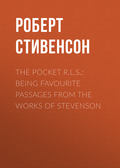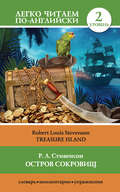
Роберт Льюис Стивенсон
Memoir of Fleeming Jenkin
CHAPTER VI. – 1869–1885
Edinburgh – Colleagues —Farrago Vitæ– I. The Family Circle – Fleeming and his Sons – Highland Life – The Cruise of the Steam Launch – Summer in Styria – Rustic Manners – II. The Drama – Private Theatricals – III. Sanitary Associations – The Phonograph – IV. Fleeming’s Acquaintance with a Student – His late Maturity of Mind – Religion and Morality – His Love of Heroism – Taste in Literature – V. His Talk – His late Popularity – Letter from M. Trélat.
The remaining external incidents of Fleeming’s life, pleasures, honours, fresh interests, new friends, are not such as will bear to be told at any length or in the temporal order. And it is now time to lay narration by, and to look at the man he was and the life he lived, more largely.
Edinburgh, which was thenceforth to be his home, is a metropolitan small town; where college professors and the lawyers of the Parliament House give the tone, and persons of leisure, attracted by educational advantages, make up much of the bulk of society. Not, therefore, an unlettered place, yet not pedantic, Edinburgh will compare favourably with much larger cities. A hard and disputatious element has been commented on by strangers: it would not touch Fleeming, who was himself regarded, even in this metropolis of disputation, as a thorny table-mate. To golf unhappily he did not take, and golf is a cardinal virtue in the city of the winds. Nor did he become an archer of the Queen’s Body-Guard, which is the Chiltern Hundreds of the distasted golfer. He did not even frequent the Evening Club, where his colleague Tait (in my day) was so punctual and so genial. So that in some ways he stood outside of the lighter and kindlier life of his new home. I should not like to say that he was generally popular; but there as elsewhere, those who knew him well enough to love him, loved him well. And he, upon his side, liked a place where a dinner party was not of necessity unintellectual, and where men stood up to him in argument.
The presence of his old classmate, Tait, was one of his early attractions to the chair; and now that Fleeming is gone again, Tait still remains, ruling and really teaching his great classes. Sir Robert Christison was an old friend of his mother’s; Sir Alexander Grant, Kelland, and Sellar, were new acquaintances and highly valued; and these too, all but the last, have been taken from their friends and labours. Death has been busy in the Senatus. I will speak elsewhere of Fleeming’s demeanour to his students; and it will be enough to add here that his relations with his colleagues in general were pleasant to himself.
Edinburgh, then, with its society, its university work, its delightful scenery, and its skating in the winter, was thenceforth his base of operations. But he shot meanwhile erratic in many directions: twice to America, as we have seen, on telegraph voyages; continually to London on business; often to Paris; year after year to the Highlands to shoot, to fish, to learn reels and Gaelic, to make the acquaintance and fall in love with the character of Highlanders; and once to Styria, to hunt chamois and dance with peasant maidens. All the while, he was pursuing the course of his electrical studies, making fresh inventions, taking up the phonograph, filled with theories of graphic representation; reading, writing, publishing, founding sanitary associations, interested in technical education, investigating the laws of metre, drawing, acting, directing private theatricals, going a long way to see an actor – a long way to see a picture; in the very bubble of the tideway of contemporary interests. And all the while he was busied about his father and mother, his wife, and in particular his sons; anxiously watching, anxiously guiding these, and plunging with his whole fund of youthfulness into their sports and interests. And all the while he was himself maturing – not in character or body, for these remained young – but in the stocked mind, in the tolerant knowledge of life and man, in pious acceptance of the universe. Here is a farrago for a chapter: here is a world of interests and activities, human, artistic, social, scientific, at each of which he sprang with impetuous pleasure, on each of which he squandered energy, the arrow drawn to the head, the whole intensity of his spirit bent, for the moment, on the momentary purpose. It was this that lent such unusual interest to his society, so that no friend of his can forget that figure of Fleeming coming charged with some new discovery: it is this that makes his character so difficult to represent. Our fathers, upon some difficult theme, would invoke the Muse; I can but appeal to the imagination of the reader. When I dwell upon some one thing, he must bear in mind it was only one of a score; that the unweariable brain was teeming at the very time with other thoughts; that the good heart had left no kind duty forgotten.
I
In Edinburgh, for a considerable time, Fleeming’s family, to three generations, was united: Mr. and Mrs. Austin at Hailes, Captain and Mrs. Jenkin in the suburb of Merchiston, Fleeming himself in the city. It is not every family that could risk with safety such close interdomestic dealings; but in this also Fleeming was particularly favoured. Even the two extremes, Mr. Austin and the Captain, drew together. It is pleasant to find that each of the old gentlemen set a high value on the good looks of the other, doubtless also on his own; and a fine picture they made as they walked the green terrace at Hailes, conversing by the hour. What they talked of is still a mystery to those who knew them; but Mr. Austin always declared that on these occasions he learned much. To both of these families of elders, due service was paid of attention; to both, Fleeming’s easy circumstances had brought joy; and the eyes of all were on the grandchildren. In Fleeming’s scheme of duties, those of the family stood first; a man was first of all a child, nor did he cease to be so, but only took on added obligations, when he became in turn a father. The care of his parents was always a first thought with him, and their gratification his delight. And the care of his sons, as it was always a grave subject of study with him, and an affair never neglected, so it brought him a thousand satisfactions. ‘Hard work they are,’ as he once wrote, ‘but what fit work!’ And again: ‘O, it’s a cold house where a dog is the only representative of a child!’ Not that dogs were despised; we shall drop across the name of Jack, the harum-scarum Irish terrier ere we have done; his own dog Plato went up with him daily to his lectures, and still (like other friends) feels the loss and looks visibly for the reappearance of his master; and Martin, the cat, Fleeming has himself immortalised, to the delight of Mr. Swinburne, in the columns of the Spectator. Indeed there was nothing in which men take interest, in which he took not some; and yet always most in the strong human bonds, ancient as the race and woven of delights and duties.
He was even an anxious father; perhaps that is the part where optimism is hardest tested. He was eager for his sons; eager for their health, whether of mind or body; eager for their education; in that, I should have thought, too eager. But he kept a pleasant face upon all things, believed in play, loved it himself, shared boyishly in theirs, and knew how to put a face of entertainment upon business and a spirit of education into entertainment. If he was to test the progress of the three boys, this advertisement would appear in their little manuscript paper: – ‘Notice: The Professor of Engineering in the University of Edinburgh intends at the close of the scholastic year to hold examinations in the following subjects: (1) For boys in the fourth class of the Academy – Geometry and Algebra; (2) For boys at Mr. Henderson’s school – Dictation and Recitation; (3) For boys taught exclusively by their mothers – Arithmetic and Reading.’ Prizes were given; but what prize would be so conciliatory as this boyish little joke? It may read thin here; it would smack racily in the playroom. Whenever his sons ‘started a new fad’ (as one of them writes to me) they ‘had only to tell him about it, and he was at once interested and keen to help.’ He would discourage them in nothing unless it was hopelessly too hard for them; only, if there was any principle of science involved, they must understand the principle; and whatever was attempted, that was to be done thoroughly. If it was but play, if it was but a puppetshow they were to build, he set them the example of being no sluggard in play. When Frewen, the second son, embarked on the ambitious design to make an engine for a toy steamboat, Fleeming made him begin with a proper drawing – doubtless to the disgust of the young engineer; but once that foundation laid, helped in the work with unflagging gusto, ‘tinkering away,’ for hours, and assisted at the final trial ‘in the big bath’ with no less excitement than the boy. ‘He would take any amount of trouble to help us,’ writes my correspondent. ‘We never felt an affair was complete till we had called him to see, and he would come at any time, in the middle of any work.’ There was indeed one recognised playhour, immediately after the despatch of the day’s letters; and the boys were to be seen waiting on the stairs until the mail should be ready and the fun could begin. But at no other time did this busy man suffer his work to interfere with that first duty to his children; and there is a pleasant tale of the inventive Master Frewen, engaged at the time upon a toy crane, bringing to the study where his father sat at work a half-wound reel that formed some part of his design, and observing, ‘Papa, you might finiss windin’ this for me; I am so very busy to-day.’
I put together here a few brief extracts from Fleeming’s letters, none very important in itself, but all together building up a pleasant picture of the father with his sons.
‘Jan. 15th, 1875. – Frewen contemplates suspending soap bubbles by silk threads for experimental purposes. I don’t think he will manage that. Bernard’ [the youngest] ‘volunteered to blow the bubbles with enthusiasm.’
‘Jan. 17th. – I am learning a great deal of electrostatics in consequence of the perpetual cross-examination to which I am subjected. I long for you on many grounds, but one is that I may not be obliged to deliver a running lecture on abstract points of science, subject to cross-examination by two acute students. Bernie does not cross-examine much; but if anyone gets discomfited, he laughs a sort of little silver-whistle giggle, which is trying to the unhappy blunderer.’
‘May 9th. – Frewen is deep in parachutes. I beg him not to drop from the top landing in one of his own making.’
‘June 6th, 1876. – Frewen’s crank axle is a failure just at present – but he bears up.’
‘June 14th. – The boys enjoy their riding. It gets them whole funds of adventures. One of their caps falling off is matter for delightful reminiscences; and when a horse breaks his step, the occurrence becomes a rear, a shy, or a plunge as they talk it over. Austin, with quiet confidence, speaks of the greater pleasure in riding a spirited horse, even if he does give a little trouble. It is the stolid brute that he dislikes. (N.B. You can still see six inches between him and the saddle when his pony trots.) I listen and sympathise and throw out no hint that their achievements are not really great.’
‘June 18th. – Bernard is much impressed by the fact that I can be useful to Frewen about the steamboat’ [which the latter irrepressible inventor was making]. ‘He says quite with awe, “He would not have got on nearly so well if you had not helped him.”’
‘June 27th. – I do not see what I could do without Austin. He talks so pleasantly and is so truly good all through.’
‘June 27th. – My chief difficulty with Austin is to get him measured for a pair of trousers. Hitherto I have failed, but I keep a stout heart and mean to succeed. Frewen the observer, in describing the paces of two horses, says, “Polly takes twenty-seven steps to get round the school. I couldn’t count Sophy, but she takes more than a hundred.”’
‘Feb. 18th, 1877. – We all feel very lonely without you. Frewen had to come up and sit in my room for company last night and I actually kissed him, a thing that has not occurred for years. Jack, poor fellow, bears it as well as he can, and has taken the opportunity of having a fester on his foot, so he is lame and has it bathed, and this occupies his thoughts a good deal.’
‘Feb. 19th. – As to Mill, Austin has not got the list yet. I think it will prejudice him very much against Mill – but that is not my affair. Education of that kind!.. I would as soon cram my boys with food and boast of the pounds they had eaten, as cram them with literature.’
But if Fleeming was an anxious father, he did not suffer his anxiety to prevent the boys from any manly or even dangerous pursuit. Whatever it might occur to them to try, he would carefully show them how to do it, explain the risks, and then either share the danger himself or, if that were not possible, stand aside and wait the event with that unhappy courage of the looker-on. He was a good swimmer, and taught them to swim. He thoroughly loved all manly exercises; and during their holidays, and principally in the Highlands, helped and encouraged them to excel in as many as possible: to shoot, to fish, to walk, to pull an oar, to hand, reef and steer, and to run a steam launch. In all of these, and in all parts of Highland life, he shared delightedly. He was well on to forty when he took once more to shooting, he was forty-three when he killed his first salmon, but no boy could have more single-mindedly rejoiced in these pursuits. His growing love for the Highland character, perhaps also a sense of the difficulty of the task, led him to take up at forty-one the study of Gaelic; in which he made some shadow of progress, but not much: the fastnesses of that elusive speech retaining to the last their independence. At the house of his friend Mrs. Blackburn, who plays the part of a Highland lady as to the manner born, he learned the delightful custom of kitchen dances, which became the rule at his own house and brought him into yet nearer contact with his neighbours. And thus at forty-two, he began to learn the reel; a study, to which he brought his usual smiling earnestness; and the steps, diagrammatically represented by his own hand, are before me as I write.
It was in 1879 that a new feature was added to the Highland life: a steam launch, called the Purgle, the Styrian corruption of Walpurga, after a friend to be hereafter mentioned. ‘The steam launch goes,’ Fleeming wrote. ‘I wish you had been present to describe two scenes of which she has been the occasion already: one during which the population of Ullapool, to a baby, was harnessed to her hurrahing – and the other in which the same population sat with its legs over a little pier, watching Frewen and Bernie getting up steam for the first time.’ The Purgle was got with educational intent; and it served its purpose so well, and the boys knew their business so practically, that when the summer was at an end, Fleeming, Mrs. Jenkin, Frewen the engineer, Bernard the stoker, and Kenneth Robertson a Highland seaman, set forth in her to make the passage south. The first morning they got from Loch Broom into Gruinard bay, where they lunched upon an island; but the wind blowing up in the afternoon, with sheets of rain, it was found impossible to beat to sea; and very much in the situation of castaways upon an unknown coast, the party landed at the mouth of Gruinard river. A shooting lodge was spied among the trees; there Fleeming went; and though the master, Mr. Murray, was from home, though the two Jenkin boys were of course as black as colliers, and all the castaways so wetted through that, as they stood in the passage, pools formed about their feet and ran before them into the house, yet Mrs. Murray kindly entertained them for the night. On the morrow, however, visitors were to arrive; there would be no room and, in so out-of-the-way a spot, most probably no food for the crew of the Purgle; and on the morrow about noon, with the bay white with spindrift and the wind so strong that one could scarcely stand against it, they got up steam and skulked under the land as far as Sanda Bay. Here they crept into a seaside cave, and cooked some food; but the weather now freshening to a gale, it was plain they must moor the launch where she was, and find their way overland to some place of shelter. Even to get their baggage from on board was no light business; for the dingy was blown so far to leeward every trip, that they must carry her back by hand along the beach. But this once managed, and a cart procured in the neighbourhood, they were able to spend the night in a pot-house on Ault Bea. Next day, the sea was unapproachable; but the next they had a pleasant passage to Poolewe, hugging the cliffs, the falling swell bursting close by them in the gullies, and the black scarts that sat like ornaments on the top of every stack and pinnacle, looking down into the Purgle as she passed. The climate of Scotland had not done with them yet: for three days they lay storm-stayed in Poolewe, and when they put to sea on the morning of the fourth, the sailors prayed them for God’s sake not to attempt the passage. Their setting out was indeed merely tentative; but presently they had gone too far to return, and found themselves committed to double Rhu Reay with a foul wind and a cross sea. From half-past eleven in the morning until half-past five at night, they were in immediate and unceasing danger. Upon the least mishap, the Purgle must either have been swamped by the seas or bulged upon the cliffs of that rude headland. Fleeming and Robertson took turns baling and steering; Mrs. Jenkin, so violent was the commotion of the boat, held on with both hands; Frewen, by Robertson’s direction, ran the engine, slacking and pressing her to meet the seas; and Bernard, only twelve years old, deadly sea-sick, and continually thrown against the boiler, so that he was found next day to be covered with burns, yet kept an even fire. It was a very thankful party that sat down that evening to meat in the Hotel at Gairloch. And perhaps, although the thing was new in the family, no one was much surprised when Fleeming said grace over that meal. Thenceforward he continued to observe the form, so that there was kept alive in his house a grateful memory of peril and deliverance. But there was nothing of the muff in Fleeming; he thought it a good thing to escape death, but a becoming and a healthful thing to run the risk of it; and what is rarer, that which he thought for himself, he thought for his family also. In spite of the terrors of Rhu Reay, the cruise was persevered in and brought to an end under happier conditions.
One year, instead of the Highlands, Alt Aussee, in the Steiermark, was chosen for the holidays; and the place, the people, and the life delighted Fleeming. He worked hard at German, which he had much forgotten since he was a boy; and what is highly characteristic, equally hard at the patois, in which he learned to excel. He won a prize at a Schützen-fest; and though he hunted chamois without much success, brought down more interesting game in the shape of the Styrian peasants, and in particular of his gillie, Joseph. This Joseph was much of a character; and his appreciations of Fleeming have a fine note of their own. The bringing up of the boys he deigned to approve of: ‘fast so gut wie ein bauer,’ was his trenchant criticism. The attention and courtly respect with which Fleeming surrounded his wife, was something of a puzzle to the philosophic gillie; he announced in the village that Mrs. Jenkin —die silberne Frau, as the folk had prettily named her from some silver ornaments – was a ‘geborene Gräfin’ who had married beneath her; and when Fleeming explained what he called the English theory (though indeed it was quite his own) of married relations, Joseph, admiring but unconvinced, avowed it was ‘gar schön.’ Joseph’s cousin, Walpurga Moser, to an orchestra of clarionet and zither, taught the family the country dances, the Steierisch and the Ländler, and gained their hearts during the lessons. Her sister Loys, too, who was up at the Alp with the cattle, came down to church on Sundays, made acquaintance with the Jenkins, and must have them up to see the sunrise from her house upon the Loser, where they had supper and all slept in the loft among the hay. The Mosers were not lost sight of; Walpurga still corresponds with Mrs. Jenkin, and it was a late pleasure of Fleeming’s to choose and despatch a wedding present for his little mountain friend. This visit was brought to an end by a ball in the big inn parlour; the refreshments chosen, the list of guests drawn up, by Joseph; the best music of the place in attendance; and hosts and guests in their best clothes. The ball was opened by Mrs. Jenkin dancing Steierisch with a lordly Bauer, in gray and silver and with a plumed hat; and Fleeming followed with Walpurga Moser.
There ran a principle through all these holiday pleasures. In Styria as in the Highlands, the same course was followed: Fleeming threw himself as fully as he could into the life and occupations of the native people, studying everywhere their dances and their language, and conforming, always with pleasure, to their rustic etiquette. Just as the ball at Alt Aussee was designed for the taste of Joseph, the parting feast at Attadale was ordered in every particular to the taste of Murdoch the Keeper. Fleeming was not one of the common, so-called gentlemen, who take the tricks of their own coterie to be eternal principles of taste. He was aware, on the other hand, that rustic people dwelling in their own places, follow ancient rules with fastidious precision, and are easily shocked and embarrassed by what (if they used the word) they would have to call the vulgarity of visitors from town. And he, who was so cavalier with men of his own class, was sedulous to shield the more tender feelings of the peasant; he, who could be so trying in a drawing-room, was even punctilious in the cottage. It was in all respects a happy virtue. It renewed his life, during these holidays, in all particulars. It often entertained him with the discovery of strange survivals; as when, by the orders of Murdoch, Mrs. Jenkin must publicly taste of every dish before it was set before her guests. And thus to throw himself into a fresh life and a new school of manners was a grateful exercise of Fleeming’s mimetic instinct; and to the pleasures of the open air, of hardships supported, of dexterities improved and displayed, and of plain and elegant society, added a spice of drama.
II
Fleeming was all his life a lover of the play and all that belonged to it. Dramatic literature he knew fully. He was one of the not very numerous people who can read a play: a knack, the fruit of much knowledge and some imagination, comparable to that of reading score. Few men better understood the artificial principles on which a play is good or bad; few more unaffectedly enjoyed a piece of any merit of construction. His own play was conceived with a double design; for he had long been filled with his theory of the true story of Griselda; used to gird at Father Chaucer for his misconception; and was, perhaps first of all, moved by the desire to do justice to the Marquis of Saluces, and perhaps only in the second place, by the wish to treat a story (as he phrased it) like a sum in arithmetic. I do not think he quite succeeded; but I must own myself no fit judge. Fleeming and I were teacher and taught as to the principles, disputatious rivals in the practice, of dramatic writing.
Acting had always, ever since Rachel and the Marseillaise, a particular power on him. ‘If I do not cry at the play,’ he used to say, ‘I want to have my money back.’ Even from a poor play with poor actors, he could draw pleasure. ‘Giacometti’s Elisabetta,’ I find him writing, ‘fetched the house vastly. Poor Queen Elizabeth! And yet it was a little good.’ And again, after a night of Salvini: ‘I do not suppose any one with feelings could sit out Othello, if Iago and Desdemona were acted.’ Salvini was, in his view, the greatest actor he had seen. We were all indeed moved and bettered by the visit of that wonderful man. – ‘I declare I feel as if I could pray!’ cried one of us, on the return from Hamlet. – ‘That is prayer,’ said Fleeming. W. B. Hole and I, in a fine enthusiasm of gratitude, determined to draw up an address to Salvini, did so, and carried it to Fleeming; and I shall never forget with what coldness he heard and deleted the eloquence of our draft, nor with what spirit (our vanities once properly mortified) he threw himself into the business of collecting signatures. It was his part, on the ground of his Italian, to see and arrange with the actor; it was mine to write in the Academy a notice of the first performance of Macbeth. Fleeming opened the paper, read so far, and flung it on the floor. ‘No,’ he cried, ‘that won’t do. You were thinking of yourself, not of Salvini!’ The criticism was shrewd as usual, but it was unfair through ignorance; it was not of myself that I was thinking, but of the difficulties of my trade which I had not well mastered. Another unalloyed dramatic pleasure which Fleeming and I shared the year of the Paris Exposition, was the Marquis de Villemer, that blameless play, performed by Madeleine Brohan, Delaunay, Worms, and Broisat – an actress, in such parts at least, to whom I have never seen full justice rendered. He had his fill of weeping on that occasion; and when the piece was at an end, in front of a café, in the mild, midnight air, we had our fill of talk about the art of acting.
But what gave the stage so strong a hold on Fleeming was an inheritance from Norwich, from Edward Barron, and from Enfield of the Speaker. The theatre was one of Edward Barron’s elegant hobbies; he read plays, as became Enfield’s son-in-law, with a good discretion; he wrote plays for his family, in which Eliza Barron used to shine in the chief parts; and later in life, after the Norwich home was broken up, his little granddaughter would sit behind him in a great armchair, and be introduced, with his stately elocution, to the world of dramatic literature. From this, in a direct line, we can deduce the charades at Claygate; and after money came, in the Edinburgh days, that private theatre which took up so much of Fleeming’s energy and thought. The company – Mr. and Mrs. R. O. Carter of Colwall, W. B. Hole, Captain Charles Douglas, Mr. Kunz, Mr. Burnett, Professor Lewis Campbell, Mr. Charles Baxter, and many more – made a charming society for themselves and gave pleasure to their audience. Mr. Carter in Sir Toby Belch it would be hard to beat. Mr. Hole in broad farce, or as the herald in the Trachiniæ, showed true stage talent. As for Mrs. Jenkin, it was for her the rest of us existed and were forgiven; her powers were an endless spring of pride and pleasure to her husband; he spent hours hearing and schooling her in private; and when it came to the performance, though there was perhaps no one in the audience more critical, none was more moved than Fleeming. The rest of us did not aspire so high. There were always five performances and weeks of busy rehearsal; and whether we came to sit and stifle as the prompter, to be the dumb (or rather the inarticulate) recipients of Carter’s dog whip in the Taming of the Shrew, or having earned our spurs, to lose one more illusion in a leading part, we were always sure at least of a long and an exciting holiday in mirthful company.
In this laborious annual diversion, Fleeming’s part was large. I never thought him an actor, but he was something of a mimic, which stood him in stead. Thus he had seen Got in Poirier; and his own Poirier, when he came to play it, breathed meritoriously of the model. The last part I saw him play was Triplet, and at first I thought it promised well. But alas! the boys went for a holiday, missed a train, and were not heard of at home till late at night. Poor Fleeming, the man who never hesitated to give his sons a chisel or a gun, or to send them abroad in a canoe or on a horse, toiled all day at his rehearsal, growing hourly paler, Triplet growing hourly less meritorious. And though the return of the children, none the worse for their little adventure, brought the colour back into his face, it could not restore him to his part. I remember finding him seated on the stairs in some rare moment of quiet during the subsequent performances. ‘Hullo, Jenkin,’ said I, ‘you look down in the mouth.’ – ‘My dear boy,’ said he, ‘haven’t you heard me? I have not one decent intonation from beginning to end.’
But indeed he never supposed himself an actor; took a part, when he took any, merely for convenience, as one takes a hand at whist; and found his true service and pleasure in the more congenial business of the manager. Augier, Racine, Shakespeare, Aristophanes in Hookham Frere’s translation, Sophocles and Æschylus in Lewis Campbell’s, such were some of the authors whom he introduced to his public. In putting these upon the stage, he found a thousand exercises for his ingenuity and taste, a thousand problems arising which he delighted to study, a thousand opportunities to make these infinitesimal improvements which are so much in art and for the artist. Our first Greek play had been costumed by the professional costumer, with unforgetable results of comicality and indecorum: the second, the Trachiniæ, of Sophocles, he took in hand himself, and a delightful task he made of it. His study was then in antiquarian books, where he found confusion, and on statues and bas-reliefs, where he at last found clearness; after an hour or so at the British Museum, he was able to master ‘the chitôn, sleeves and all’; and before the time was ripe, he had a theory of Greek tailoring at his fingers’ ends, and had all the costumes made under his eye as a Greek tailor would have made them. ‘The Greeks made the best plays and the best statues, and were the best architects: of course, they were the best tailors, too,’ said he; and was never weary, when he could find a tolerant listener, of dwelling on the simplicity, the economy, the elegance both of means and effect, which made their system so delightful.







